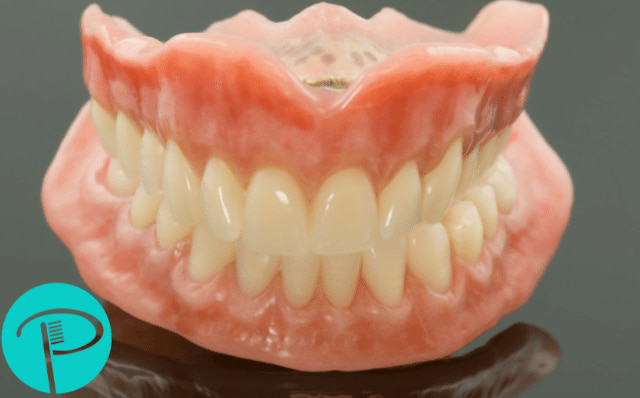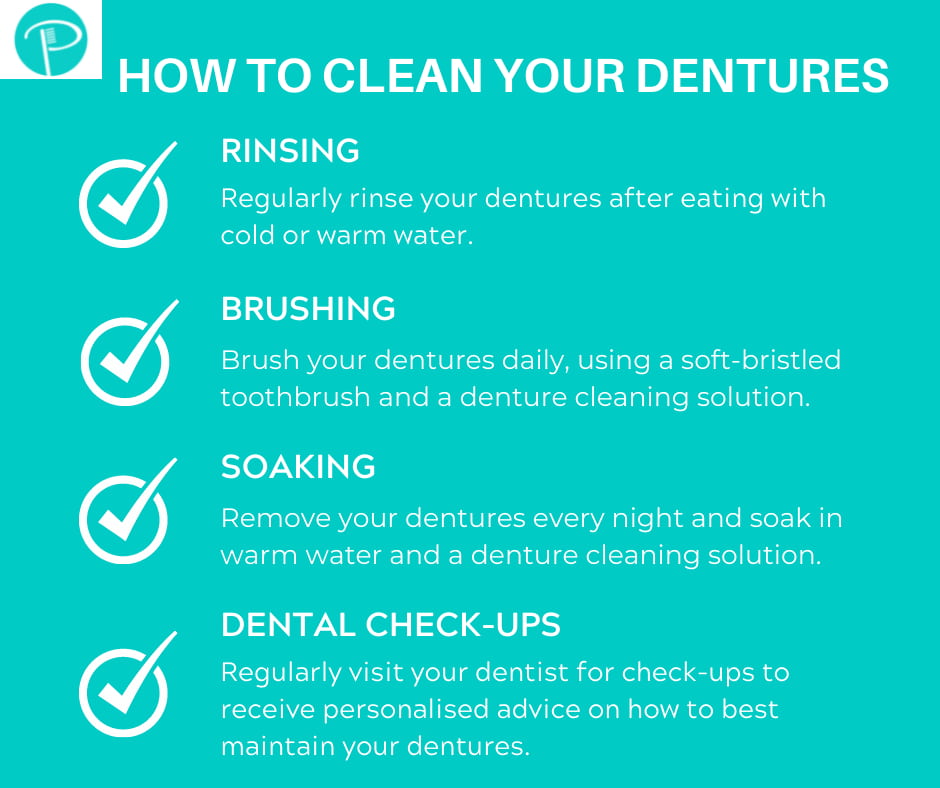How to Clean Dentures

Dentures are artificial teeth that can be fitted to someone’s mouth to replace missing natural teeth and strengthen damaged gums. Dentures, also known as false teeth, can be categorised into:
- Complete dentures: Entire rows of teeth on the top or bottom.
- Partial dentures: Created to replace only a few missing teeth.
Dentures are utilised to improve the mouth’s structural integrity, making eating and speaking easier. Furthermore, patients with dentures can also enjoy improved self-confidence and mental well-being thanks to their new set of teeth.
While dentures are a fantastic way to restore the appearance and function of natural teeth, you must maintain them so that they don’t become damaged, discoloured, or structurally unsound. Like regular teeth, dentures are susceptible to damage or discolouration, particularly from smoking, eating hard, sticky foods, or drinking lots of tea, coffee, or red wine.
For this reason, knowing how to clean dentures is critical for maintaining the quality of your dentures and oral health.
How to Maintain Your Dentures
Our mouths are acidic, constantly active, and filled with bacteria, so general wear-and-tear, staining and degradation are inevitable. However, this does not mean that the quality of your dentures cannot be maintained for a long time.
Maintaining dentures is more than avoiding tough, chewy food like candy, nuts, and popcorn. There are four components to excellently maintaining your dentures which include:
- Rinsing
- Brushing
- Soaking
- Regular Dental Check-Ups
Failure to do so can not only cause damage to your dentures but also result in plaque build-up and increase the risk of gum disease or tooth infections.

1. Rinsing
Unlike braces or caps, you can and should take dentures out each night to clean, rinse, and soak.
Rinsing is essential to the maintenance process because it removes food scraps and excess germs or bacteria accumulated on your dentures throughout the day. You will want to rinse after eating your last meal of the day, and you can use cold or warm water. Avoid using hot water as it can morph or warp your dentures, resulting in discomfort.
Rinsing your dentures benefits you because it prevents buildups of bacteria, gives your gums a break, and keeps your breath fresh.
2. Brushing
Just like teeth, you should brush your dentures daily. While rinsing is an effective method for quickly washing your dentures, brushing offers a more thorough clean and ensures the removal of any bacteria.
While dentures are strong, they can be delicate. Therefore when brushing your dentures, you should use a soft-bristled toothbrush and lightly clean the area. As dentures are made of many different materials, over-brushing or brushing too hard can cause gradual deterioration of your false teeth.
Furthermore, it would be best if you used a denture cleaning solution or mild soap when brushing your dentures. Most regular kinds of toothpaste are too abrasive for artificial teeth, which increases the risk of damaging your dentures. Therefore, we recommend sticking to mild, easy solutions for artificial teeth.
3. Soaking in Denture Cleaning Solution
Whether you have complete or partial dentures, you should always soak them in warm water and a cleaning solution when not wearing them. Dentures either need to be worn or kept moist. If they are left out to dry up, it can cause them to become misshapen and crack. We recommend that dentures should only be dry for a few hours, so make sure that you keep them either in your mouth, in water, or in a special cleaning solution that is easy on denture adhesive.
Many websites claim to have the “best homemade recipes for denture cleaners or soaking solutions, ” including ingredients like bleach, salt, vinegar, baking soda, or mouthwash. However, while bleach and vinegar can be great for disinfecting, we do not recommend these homemade remedies as they pose a risk to your general and oral health. Not only could it be unsafe for a person if they do not wash the solution off properly, but it can also damage your dentures.
Instead, it would be best if you soaked dentures overnight in a special denture-soaking solution from trusted brands such as Polident or All Smiles. Considering that dentures can be relatively expensive, you want to minimise causing any unnecessary damage to them by using homemade solutions.
4. Regular Dental Check-Ups
Similar to patients with normal teeth, you must adhere to regular dental check-ups with a dentist to ensure your dentures are functioning correctly. Although strong, your dentures need consistent check-ups to ensure that they are clean, well-fitting and don’t need any improvements.
Ill-fitting dentures can contribute to difficulty eating, trouble speaking, slippage, cleaning problems, and mouth ulcers. Therefore, it is best to book regular visits to a dentist for expert advice.
Visiting a dentist regularly is one of the best ways to ensure the quality and longevity of your dentures. For example, at Putney Dental Care, our denture specialists will examine your dentures and inspect your gums for any signs of disease or infection. Following this, we provide personalised recommendations on how you can manage your dentures to ensure long-lasting quality.
For more information on how our dental clinic can help you, contact our dentistry team to organise a denture consultation and start your journey for a brighter, healthier smile!
How to Whiten Dentures
Dentures can only be whitened by having a new denture created by a dentist or manufacturer. Unlike real teeth, dentures do not respond to artificial whitening solutions. This is because false teeth are made from acrylic materials, which cannot be whitened by homemade solutions, scrubbing, or soaking. In fact, there is a higher chance that attempts to whiten your dentures will result in damage and decay.
What to Avoid When Cleaning Dentures
Many cleaning practices will contribute to the deterioration of your dentures and should be avoided at all costs.
These include the following:
- Sleeping with dentures overnight
- Forgetting to rinse, brush and soak dentures daily
- Soaking in hot or boiling water
- Using a homemade denture cleaner
- Using abrasive cleaning or whitening products
- Eating hard, chewy foods
- failing to see a dentist regularly
- Using regular toothpaste to clean dentures
- Not using a soft bristle toothbrush
- Pushing too hard when you brush your dentures
FAQs
Do Dentures Need to be Cleaned Every Night?
Dentists and oral hygienists recommend that dentures be cleaned at least once daily. While this does not necessarily have to be at night, this time makes sense because dentures should be removed and soaked while you sleep. It is also much easier to remove plaque and look after the metal parts if you do it regularly, rather than letting them harden and accumulate.
Is it OK to Sleep with Dentures?
No. You should remove your dentures, clean them, and soak them overnight. Dentures can be tough on your gums, a breeding ground for bacteria, and susceptible to plaque buildup. Therefore, wearing them at night can increase your risk of oral health issues such as gum disease or tooth infection.
How Long Can You Leave Your Dentures in?
You should not leave dentures all day and all night. It is general practice to wear them throughout the day and soak dentures overnight. This gives your gums a break, gives your false teeth a clean, and allows for a healthy, restful night’s sleep.
Can You Use Mouthwash with Dentures?
Mouthwash does not damage your false teeth in any way, in fact, some people even choose to soak their dentures in water with a little bit of mouthwash in it. When it comes to denture cleaning, dentists would advise that you skip the mouthwash and stick to denture cleanser or warm water to ensure they don’t become misshapen.
Root Canal vs Filling: What Procedure Do I Need? Why Do I Have Itchy Gums? Causes and TreatmentsLatest from the Dental Blog
 20 Apr 2022
20 Apr 2022
Remove Tartar at Home
If you’re concerned about tartar buildup changing the colour of your teeth, there are things you can do at home…
